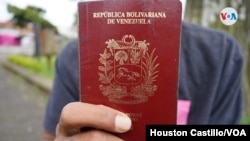Silvestre Chuello learned of the death of his friend Judith Cáceres Contreras suddenly, when the complete list of migrants who were on a bus that overturned in Nicaragua was released. He requested a phone call to communicate with a Venezuelan compatriot who is in Costa Rica and there he confirmed his suspicions.
-Did you realize the death of the Venezuelan brothers in an accident in Nicaragua?
-Yes, my sister died there, Judith -, answered his friend on the other end of the phone. Silence took over Chuello and the group that accompanied him at that moment.
Recently this Venezuelan had arrived in San José from Panama along with another group seeking to reach the United States.
“This is very difficult, we come from a journey in the Darien to die in a traffic accident,” he said visibly saddened about the death of his friend.
Over the weekend they died in Nicaragua 16 migrants in a traffic accident15 of them were Venezuelans, in the first incident of such magnitude involving Venezuelan citizens fleeing one of the worst humanitarian crises in Latin America.
Migrants from the region who pass through countries such as Nicaragua, Honduras, Guatemala, Ecuador and other countries on their way to the US are often exposed to adverse situations that sometimes threaten the physical integrity of these people.
David Smolansky, commissioner of the general secretariat of the Organization of American States for the crisis of Venezuelan migrants comments to the voice of america that “it is extremely moving to see compatriots die because they are fleeing a dictatorship” and stresses that those who leave the country do so out of “necessity.”
According to his calculation, some 6.2 million Venezuelans have fled due to persecution, insecurity, food and medicine shortages, as well as the lack of basic services in the country governed by Nicolás Maduro.
“Unfortunately, there are many who, when trying to flee Venezuela, have died on some migratory route,” he emphasizes while stating what, in his opinion, could only stop this “human landslide.”
“That democracy, freedoms and the rule of law be restored in Venezuela,” he said.
Moisés Puerta is a 30-year-old Venezuelan who arrived with Chuello in Costa Rica and plans to spend a few days trying to earn some money to get to Mexico.
He explains that getting money from people is more difficult in other impoverished countries and Costa Rica represents a destination where solidarity has become noticeable.
During his time in the Darién jungle weeks ago, he explains that he witnessed tragedies with his compatriots who left Venezuela en masse with him.
“It is tragic because this is a humanitarian issue that we Venezuelans are experiencing, terrible. During this journey I have seen these compatriots, not only die, go through many difficulties, women who are raped, human trafficking, people kidnapped, it is quite terrible, ”he said.
During the conversation, he asked human rights organizations to collaborate with Venezuelans so that they obtain free transit to the countries they travel through.
“We do not want to inconvenience anyone, we want to reach the United States, but it is very difficult considering that most countries close their doors to us,” he said.
Recently Costa Rica joined Mexico and began to request a visa from Venezuelans to enter their countries, and although migration has not stopped, it has put obstacles in their way, say those interviewed.
Smolansky, who works at the OAS with the issue of Venezuelan refugees, indicates that according to the figures, these are the third nationality of migrants who die in transit to reach a destination, only surpassed by Guatemalans and Mexicans.
It recognizes that there are several points of risk for Venezuelans, such as the Darien jungle: “It is the most dangerous jungle on the continent due to a series of characteristics that converge there, such as extreme temperatures in areas of the jungle.”
“There is a river that crosses the jungle and many times it is swollen, in addition to being contaminated by corpses that have decomposed,” he laments.
Smolansky warns that in the Darién there are wild animals, very poisonous reptiles and there is the presence of irregular armed groups that are dedicated to human trafficking, people smuggling, stealing belongings and raping women.
“There is nothing more dangerous than the Darién and that is why I have responsibly said that, despite the fact that when fleeing from a dictatorship one does not choose where to go or how to go or when, those who can avoid the Darién jungle, avoid it, because your lives are in danger,” he concluded.
Connect with the Voice of America! Subscribe to our channel Youtube and turn on notifications, or follow us on social networks: Facebook, Twitter and Instagram.

![[Img #74743]](https://thelatestnews.world/wp-content/uploads/2024/12/More-tendency-towards-obesity-when-living-in-a-city-150x150.jpg)















Add Comment